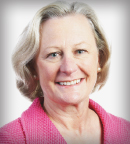Julie Gralow, MD, FACP, FASCO, ASCO’S Chief Medical Officer, issued the following statement in light of World Cancer Day on February 4.

Julie Gralow, MD, FACP, FASCO
“This year’s World Cancer Day theme, ‘Close the Care Gap,’ speaks to the heart of what it means to achieve progress against cancer today. In the shadow of COVID’s terrible and unequal toll, health equity needs to be a central motivation for all of us working in cancer care and research. It’s time to truly move the needle so underserved communities in the United States and around the world can receive the high-quality, equitable care they deserve.”
“Here in the United States, even as we have achieved consistent declines in cancer death rates over the several decades, systemic inequities have kept many communities from experiencing the same progress. According to recent data from the American Cancer Society, Black men remain twice as likely as White men to die of prostate cancer; Black women are 40% more likely than White women to die of breast cancer; and [according to recent research published in Advancing the Science of Cancer in Latinos] Hispanic individuals are more likely than White individuals to be diagnosed with advanced stages of cancer, leading to worse outcomes after diagnosis.”
“The COVID-19 pandemic has exacerbated existing disparities that range from screening to cancer outcomes, which we’ve captured in some of our own data. A study [published in the Journal of Clinical Oncology] using data from ASCO’s CancerLinQ Discovery® found that Black and Hispanic patients with cancer were more likely to be infected with COVID-19 than White patients.”
“To some extent, Americans themselves recognize the inequities in care. According to our own National Cancer Opinion Survey, nearly 6 in 10 Americans believe racism can affect the health care a person receives.”
“So, while the challenge is formidable, we know that meaningful change is possible. Just this week, new data from KFF showed that the biggest declines in rates of recent cancer deaths were in Black communities, and rates of new cancer diagnoses fell fastest among American Indian and Alaska Native and Black people.”
“ASCO has a long history of working toward equitable cancer care and research, and most recently issued the ASCO’s Equity, Diversity, and Inclusion Action Plan: A Legacy of Commitment, A Future of Promise for All Individuals with Cancer, which is designed to infuse equity throughout the society’s activities. We lend our support to World Cancer Day as a unique opportunity to draw international attention on the need to the accelerate progress we’ve seen in cancer prevention, screening, care, and outcomes, and make headway toward true equity for all individuals with cancer.”
“We are also encouraged by President Biden’s announcement to reignite the Cancer Moonshot with a major focus on equity, diversity, and inclusion. This heightened attention can propel us to invest even more of our time, energy, and resources in closing the remaining gaps. This World Cancer Day, we must all commit to ensuring that everyone, no matter who they are, where they live, or their socioeconomic status, can benefit fully from advances in cancer science and patient care.”

